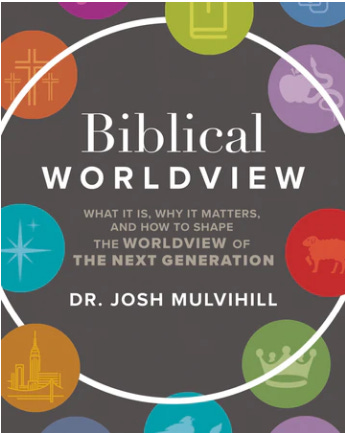Within the past two months, I have emersed myself in research and reading about classical Christian education. In addition to teaching using classical methodology, CCE schools also teach through the lens of a biblical worldview. Because I do not come from a background where I used classical methodologies exclusively to teach, I am reading to learn what CCE should look like. The component that is crucial and sets CCE apart from other schools is teaching from and helping students learn how to view the world through scripture.
I recently consumed Biblical Worldview: What It Is, Why It Matters, and How to Shape the Worldview of the Next Generation, by Dr. Josh Mulvihill. The central idea is that families, churches, and schools should work together to help children develop their own beliefs about the world based on scripture. The goal is to help young people understand that building their beliefs on the truth of the gospel will lead them to live godly lives. They should desire truth, goodness, and beauty.
This text does not read like an academic one, though it heavily cites scripture throughout. Moreover, Mulvihill speaks with clarity as he explains why our children should have biblical worldviews, what we must teach them so that a biblical worldview becomes a part of them, and why we should count the cost of not preparing their minds in this manner. He writes broadly yet succinctly about the Bible, the Gospel, and four critical elements of a biblical worldview: creation, disobedience, salvation, and restoration. I recommend that parents, grandparents, teachers, and church staff read it; it is extremely accessible.
Parents are responsible for their children’s academic and spiritual educations. Period. If you drop your child off at the bus stop and have the mindset that the school will take care of your child’s education, then you are correct. It will, and it usually will not be the education you expect or want. Schools, especially public ones, are microcosms of society. If you do not pay attention to the friends your children have and the adults who influence them at school, then do not be surprised if your children come home with a worldview that is the antithesis of what you want them to have.
Time is of the essence. Mulvihill says, “A child’s belief system, his or her worldview, is almost fully formed by the age of twelve” (34). It is never too early to begin teaching our children about who God is, why he loves us, how we were created, why we do bad things, how God forgives us, and how God’s plan is to restore our relationship with Him.
As Christians, we should want our children to have a biblical worldview. Homes, churches, and schools that are like-minded are successful in helping children internalize biblical truth. Parents should be purposeful when choosing both their church and their children’s school so that both organizations support and enrich what their children are learning at home about God and the world.
Mulvihill is a graduate of Southern Seminary in Louisville, KY. He has served in ministry for 20+ years and is currently the Executive Director of Church and Family Ministry at Renewanation, a ministry that focuses on supplying parents, grandparents, educators, schools, and churches with the resources they need to help children develop a biblical worldview. To learn more about the mission and vision of this organization, visit renewanation.org.





